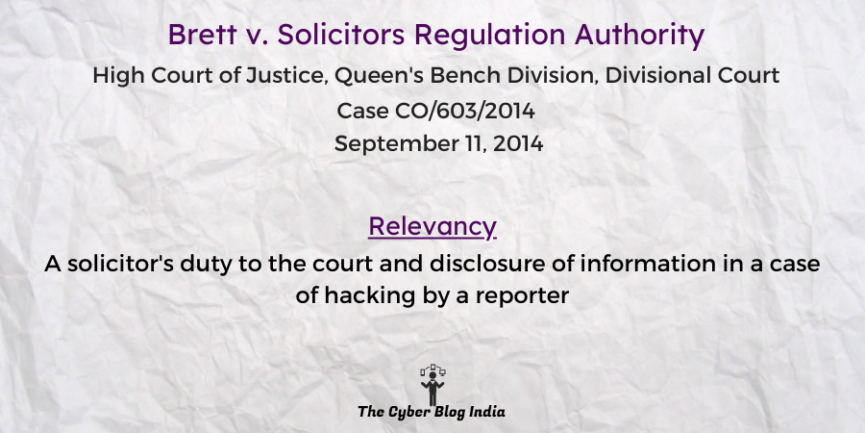Brett v. Solicitors Regulation Authority

Brett v. Solicitors Regulation Authority
[2014] EWHC 2974 (Admin)
In the High Court of Justice, Queen’s Bench Division, Divisional Court
Case CO/603/2014
Before Lord Chief Justice Thomas and Justice Wilkie
Decided on September 11, 2014
Relevancy of the case: A solicitor’s duty to the court and disclosure of information in a case of hacking by a reporter
Statutes and Provisions Involved
- The Solicitor’s Act 1974 (Section 46, 47(1)(b), 47(2)(i), 49)
- The Computer Misuse Act 1990 (Section 1)
- The European Convention on Human Rights 1950 (Article 8)
Relevant Facts of the Case
- The appellant was an in-house counsel for The Times. A junior reporter informed him that he identified an anonymous blog writer, ‘Nightjack’. The reporter had hacked into the writer’s email.
- The appellant told the reporter that the method was illegal and he could not publish such news. The reporter assured him that he could also identify the person through legitimate means.
- The writer sought an injunction to not publish the story. It was granted that The Times would give a 12-hour prior notice before publishing.
- The Times gave a notice on May 28, 2009. However, the writer commenced injunction proceedings. The appellant did not inform The Times’s representing counsel of the initial hacking. The appellant further approved the reporter’s witness statement.
- A separate inquiry revealed that the appellant had misled the court. The Solicitors Discipline Tribunal (SDT) found him in breach of his duties.
Prominent Arguments by the Counsels
- The appellant’s counsel argued that:
- Communication between the reporter and the appellant was privileged.
- He had a right against self-incrimination.
- The potential for the witness statement to be misleading only appeared in hindsight.
- He did not consider previous emails a part of the subsequent proceedings.
- The outcome of the writer’s litigation would have been the same even if the information was revealed.
- The defendant’s counsel submitted:
- There is a difference between deceit and knowingly misleading the court.
- The latter refers to allowing the court to form an incorrect assumption.
- The appellant could have clarified the facts without breaking the client’s privilege.
Opinion of the Bench
- SDT had found the appellant guilty of dishonesty even though that was not the intention.
- The court can only allow for quashing the dishonesty order. Instead, he is found guilty of ‘recklessly’ misleading the court.
Final Decision
- The bench partially allowed the appeal.
